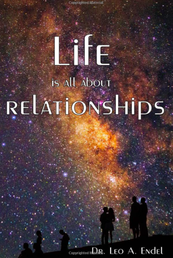|
In last week’s article, I mentioned the book Life is all about Relationships by Leo Endel. In the opening chapter, entitled God is about Relationships, Leo points to one of the clearest passages in scripture regarding the triune nature of God—John 14:23-26. Jesus answered and said to him, “If anyone loves Me, he will keep My word; and My Father will love him, and We will come to him and make Our home with him. He who does not love Me does not keep My words; and the word which you hear is not Mine but the Father’s who sent Me. These things I have spoken to you while being present with you. But the Helper, the Holy Spirit, whom the Father will send in My name, He will teach you all things, and bring to your remembrance all things that I said to you.” As Christians, we believe in one God who has described Himself in relational terms as Father, Son, and Holy Spirit. Genesis tells us that humanity was created by Him in His image and likeness (Genesis 1:26). We too are relational beings, and as such, our spiritual and physical health depends upon having good relationships with one another and with God.
Another recent read of mine has been Finishing Strong by Steve Farrar. [You can find a discussion summary of it on the HCN website resource library] In it, Farrar reminds us of four different research projects that point to the importance that relationships play in our physical health. At Ohio State University College of Medicine, scientists found that patients who scored above average in loneliness had significantly poorer functioning of their immune system.
As we enter the New Year, Be It Resolved that we will place a higher priority on relationships. One way we can do this is by not letting the “new normal” blind us in this critical area. A prime example of “relational blindness” comes from what we now accept as an appropriate response to COVID. I am absolutely convinced that as serious as this virus is; as many unknowns as there are related to its long-term health impact; and as many variables as there are regarding the vaccines being developed for it; that politicians and medical administrators, for the most part, have been blind to the relational needs of people as they are establishing COVID protocols. Doctors and nurses, who are already under great stress, have to constantly adjust to ever-evolving protocols with little, if any, input into what makes sense. Patients are being isolated as hospitals don’t permit even a single family member to visit. This isolation is creating emotional stress for both the patient and the family. As such, they are ignoring the findings of long-established social science AND the basic relational nature of human beings. Be It Resolved that those of us who have the responsibility to make decisions regarding how our church responds to the ever-evolving COVID restrictions, that we will not fall prey to “relational blindness.” Every church will have people who are spread across the full spectrum of the COVID Perspective Scale. As such, any decision you make will upset someone. Be patient with those who take these positions. My council has been for everyone to use common sense, common courtesy, and uncommon grace. But as is often the case, it preaches easier than it is lived out. Be It Resolved that you will sustain key relationships in spite of the challenges. One of Satan’s tried and true ways to keep pastors and church leaders from long-term success is to get them isolated—to cut them out from the herd. Relational blindness applies to those of us who think we can do ministry alone. Farrar’s book on finishing strong points out that one of the key indicators for failing to finish strong is not being involved in a personal accountability group (page 40). If you are not currently involved in a small accountability group with other pastors or church leaders, then I exhort you; I plead with you; I beg you to give me a call, and we can work together to get you plugged into one. May your 2021 be filled with healthy growing relationships! Yours in Christ, Mark R. Elliott, DoM
0 Comments
 Were you able to see the Christmas Star this past Monday night? Every 20 years Saturn and Jupiter come close enough that if it occurs at night they create a brighter “star.” However, scientists tell us that this year’s conjunction, which happened in the early evening of the winter solstice, appeared closer than it has since just before dawn on March 4, 1226. At the time of creation, God put the stars and planets in place and set them in motion (Genesis 1:14-18). Astronomers have been observing and charting them since that time. Stop and think about it, science is defined as “the observation, identification, description, experimental investigation, and theoretical explanation of phenomena.” The next time someone says to you science and religion don’t mix, remind them that science exists only because God created the universe and gave the scientists something to study. In fact, the very concept of a reproducible scientific experiment demands that God’s creation will be the same yesterday, today, and tomorrow, just like He is. The recent appearance of the Christmas Star reminded me that God is still in charge. He has not changed His ways, and He will fulfill every promise He has made. Thousands of years after God created the universe, astronomers (wise men) from the east observed: “a star” that they associated with Jewish prophecy concerning the birth of a uniquely anointed king—The Messiah (Matthew 2:1-12). Scholars still debate what that star was, with some suggesting it was the conjunction of Saturn and Jupiter. Whatever the star was, it brought scientists to the palace of King Herod in Jerusalem with the assumption that they would have the privilege of presenting gifts to a newborn that was destined to be king of the Jews. Instead of seeing a newborn king they created confusion and observed a king who quickly became deeply disturbed and defensive. Herod asked clarifying questions about the appearance of the star, and then he sent them on their way with a request, “When you find him, report back to me so that I too can go and worship him.” We can be pretty sure of Herod’s motives based on how he responded when the scientists didn’t report back to him (Matt 2:16-18). The scientists also encountered religious leaders who were quickly able to provide additional prophecy that clarified that this uniquely anointed king was to be born in Bethlehem not Jerusalem. However, the religious leaders were either uninterested in or unimpressed by the scientist’s observations. None of them took time to travel with them even though Bethlehem was only a few miles from Jerusalem. The motives of the Jewish leaders are not as easily discerned. Were they offended that God was willing to use unwashed Gentiles? Were they exhibiting religious arrogance? Did their in-depth interpretation of the Holy Scriptures indicate that it wasn’t the right time? Were they revealing their intellectual blindness? Was their religion a purely legalistic, ritualistic faith? Were they spiritually indifferent? My motives were challenged recently as I read the book Life is all about Relationships. It was written by a friend of mine, Dr. Leo Endel. For those who know me, you are aware that my personality moves naturally to the task side of the task—relationship pendulum. I was reminded as I read it, that as task-oriented as God is--what He said He would do He will always do—He always does it through relationships. It is interesting that the cover of the book shows people in relationships silhouetted against a starry night sky—which includes a particularly bright star. What is God telling you through the Christmas Star? Yours in Christ, Mark R. Elliott, DoM Now before you get too excited and think I have lost it, let me say what Amos said to Amaziah the priest of Bethel. “I am not a prophet nor am I the son of a prophet” (Amos 7:14 NAS). However, God has helped me to gain some wisdom and discernment in my threescore and ten years of life. On the eve of a new year, my wondering mind is pondering what it might hold. Now throw in the fact that I try to be an astute observer of human life and human interaction, and my imagination goes wild. Because 2020 has been a challenge beyond anything we had thought or imagined, any prediction for 2021 sounds plausible. Here are my thoughts. Having been involved in attempting to mediate conflict in the church for years, I can see racial and political tensions in our nation continuing to escalate into the new year. I see people talking about each other rather than with each other. We are not having a substantive dialogue about real issues; instead, we are attacking and calling each other names. We have become so entrenched in our ideologies that we are not able to see flaws in them. We need to be willing to ask, “Am I more a part of the problem or a part of the solution?” In my July 28th article, I talked about levels of conflict. Culturally we are at least at Level IV: Fight/Flight with some people already exhibiting Level V: Intractable attitudes and actions. Stop and ask yourself, “What must happen for this trajectory to change?” “Where will the leadership come from that can bring our nation together?” Let me suggest that it will not come from the political arena or the white house in Washington! It can only come from spiritual leadership derived from humble prayer times in the church house! We have to step up, step out, and become part of the solution rather than being part of the problem. As hard as it will be, we must become the peacemakers. To be true peacemakers, we will have to embrace and then live out the qualities Jesus described in the other Beatitudes:
3Blessed are the poor in spirit: for theirs is the kingdom of heaven—Humility will need to replace the hubris that exists in some of us. Pride comes before every fall. We need to reaffirm that every human being is an image-bearer of the God we claim to serve. And therefore, someone for whom Jesus died. 4 Blessed are they that mourn: for they shall be comforted—When is the last time that tears came to your eyes as you listened to the news or heard about another tragic death? Have we become numbed by the daily barrage of violence, and the never-ending consequences caused by the decimation of the nuclear family? 5 Blessed are the meek: for they shall inherit the earth— Hypocrite is the word used most often by those outside the church to describe us. Our holier than thou attitude does not sell well. We need to reclaim Paul’s spirit as he wrote Timothy, “And I thank Christ Jesus for our Lord who has enabled me because He counted me faithful, putting me into the ministry, although I was formerly a blasphemer, a persecutor, and an insolent man; but I obtained mercy because I did it ignorantly in unbelief. And the grace of our Lord was exceedingly abundant, with faith and love which are in Christ Jesus. This is a faithful saying and worthy of all acceptance, that Christ Jesus came into the world to save sinners, of whom I am chief” (I Tim 1:12-15). 6 Blessed are they which do hunger and thirst after righteousness: for they shall be filled—This is the very heart of the gospel we seek to proclaim. Paul stated, “For I am not ashamed of the gospel of Christ, for it is the power of God to salvation for everyone who believes, for the Jew first and also for the Greek. For in it the righteousness of God is revealed from faith to faith; as it is written, ‘The just shall live by faith.’ For the wrath of God is revealed from heaven against all ungodliness and unrighteousness of men, who suppress the truth in unrighteousness, because what may be known of God is manifest in them, for God has shown it to them” (Romans 1:16-19). 7 Blessed are the merciful: for they shall obtain mercy—Mercy, grace, and compassion would be three words that would describe how Jesus responded to the common man. He had harsh words for the religious elite because they were quick to criticize and cast out those who were struggling in life. The story of the woman caught in adultery in John 7:53-8:11 is more a story about the scribes and the Pharisees “being right the wrong way” than it is about a woman who knew that “wrong was wrong.” We need to be “right the right way!” 8 Blessed are the pure in heart: for they shall see God—Our motives and intentions do matter. However, our hearts are easily self-deceived. Are we willing to listen to others when they criticize our approach to the lostness around us? Do we rail at the darkness more than we weep and mourn for the devastation caused by sin? We are not yet at the point of needing the last two, but the time is rapidly approaching. 10 Blessed are they which are persecuted for righteousness' sake: for theirs is the kingdom of heaven. 11 Blessed are ye, when men shall revile you, and persecute you, and shall say all manner of evil against you falsely, for my sake. I must confess that none of us know what the future holds, but we do know Who holds the future! And we know what we must do to change the future that I see coming our way. Are we willing to do it? Yours in Christ, Mark R. Elliott, DoM Many of you have heard about and some of you have even been involved in World Changers. For those who have never heard of it, World Changers was a pre-packaged youth mission adventure that combined learning and using construction skills, connecting with people (usually in a cross cultural context), evangelism, and high-energy worship. It originated with the Brotherhood Commission in 1990, was moved under the umbrella of the North American Mission Board in 1997 with a major SBC restructuring, and then was later picked up by LifeWay. Unfortunately that nationally coordinated ministry has been discontinued.
Members of Heartland Community Baptist Church were involved for many years beginning in 2001 when Sioux City hosted its first World Changers. They are excited about establishing a similar ministry called LifeChanger Missions; and Heartland Church Network is pleased to come alongside them to support this impactful ministry. It will be held June 13-19, 2021. Here is a quick overview: VISION: Changing lives one house at a time. MISSION: Training teenagers and college students for Christian missions by transforming the lives of families through home repair and evangelism. 2021 THEME: “Answer the Call” Isaiah 6:8-9 There are multiple ways you can get involved.
For more information check out the facebook page, Life ChangerMissions. Our Heartland Church Network’s webpage and FaceBook will have information on it shortly. If you have ever traveled in a predominantly Muslim country, you have heard the “Call to Prayer.” Every mosque has some way of making a public pronouncement much like churches used to ring their bells to announce it’s time for Sunday worship. But instead of hearing the bells once a week, you will hear the call to prayer five times a day. If you have ever had a serious conversation with a Muslim, you have been asked, “Why don’t Christians pray?” For Islam, the daily prayers are one of the five pillars or foundational acts. The Five Pillars of Islam are the five obligations that every Muslim must satisfy in order to live a good and responsible life. A practicing Christian could honestly respond, “I do pray, but it’s not a ritualistic obligation that I do primarily in public. Rather it is a joy to come into the presence of almighty God on a daily basis in the quietness of my home, and on Sundays and special occasions I gather with other believes and we pray together.” With Christianity, we are not tied to the legalistic works salvation of Islam. Much of the New Testament speaks to the reality that we were also freed from the legalism of Judaism. Paul speaks to that freedom in Romans 6:5-13: For if we have been united together in the likeness of His death, certainly we also shall be in the likeness of His resurrection, knowing this, that our old man was crucified with Him, that the body of sin might be done away with, that we should no longer be slaves of sin. For he who has died has been freed from sin. Now if we died with Christ, we believe that we shall also live with Him, knowing that Christ, having been raised from the dead, dies no more. Death no longer has dominion over Him. For the death that He died, He died to sin once for all; but the life that He lives, He lives to God. Likewise, you also, reckon yourselves to be dead indeed to sin, but alive to God in Christ Jesus our Lord. My daily Bible reading this morning was in the book of Hosea. That means I have recently read Jeremiah and Lamentations. When you read these books and take an honest look at our culture today, you have to see that our nation is on the brink of judgment. As I read scripture and history, I see two primary ways that God purifies His people. One is through a sweeping spiritual awakening, and the other is by simply removing His hand of protection and letting us “sow the wind and reap the whirlwind” (Hosea 8:7). The reality is that both individually (as a professing believer) and corporately (as the body of Christ) we get to choose our response: prayer and repentance that leads to spiritual renewal or staying our current course that leads to trials and tribulation. One of Henry Blackaby’s seven realities is that we must make major adjustments in our lives if we are going to join God in what He is doing. I want to take this venue to humbly commit myself to a heightened time of prayer, fasting, and confession knowing “it’s me, it’s me O Lord, standing in the need of prayer1.” God said to Solomon, “If My people who are called by My name will humble themselves, and pray and seek My face, and turn from their wicked ways, then I will hear from heaven, and will forgive their sin and heal their land.” (II Chronicles 7:14) Let me close by asking you if you have already committed yourself to a season of heightened prayer, fasting, and confession, let me know so we can encourage one another. If you haven’t made that commitment, I herein implore you to seek God’s face about making such a commitment. As we are in the midst of celebrating the arrival of the Christ child and approaching the new year, let me also extend a challenge to join me as I encourage Heartland Network churches to seek times of specific and focused prayer akin to what Joel called for in his day: Consecrate a fast, Call a sacred assembly; Gather the elders and all the inhabitants of the land into the house of the Lord your God, and cry out to the Lord. (Joel 1:14) Lord, help us to prioritize prayer in a way that honors you and doesn’t move us into a legalistic, meaningless repetition of words or practices that simply become “sounding brass, or tinkling cymbal.” Help us, O Lord, to acknowledge our sins and turn from our wicked ways. 1Standing in the Need of Prayer. African Spiritual whose author is unknown. This is the last of a series of articles on making changes in the church. I have emphasized that it must be the right change, done at the right time, and in the right way. I even threw in an example of Community Bible Church in Crofton where an established church recently voted unanimously (with one abstention) to make major changes. Church leaders laid a solid foundation and did it at the right time and in the right way.
When I talk about doing it the right way, I am emphasizing the fact that even if you have the authority to implement the right change and you know beyond a shadow of a doubt that it is the right time for that change, you can do it in an arbitrary way that alienates those who are needed to implement the change. I can’t tell you how many times I have heard, “It might have been the right thing to do, but it was done the wrong way.” Or, “I’m not upset about what he did, but how he did it.” I have discovered that the right way can have a lot of moving parts that need to be identified and addressed. Here are a few of them:
A skilled leader will throw out ideas in informal settings, say over a cup of coffee. The Holy Spirit can filter the bad ones and reinforce the best ones. Then when a good idea is suggested, the leader who planted the seed of thought can say, “You know I think that idea has some promise.” Effective leaders create an environment where people are granted the freedom to suggest new ideas. That is an environment where multiple ideas are regularly discussed, evaluated, and prayed over. Then when changes are proposed, church members know that the idea has been thoroughly evaluated and prayerfully considered. My prayer is that this series of articles will help you as you identify the right changes, implement them at the right time, and do it the right way. |
AuthorRetired in April 2022, Mark R. Elliott served as a Director of Missions (Associational Mission Strategist) in Western Iowa and Eastern Nebraska for almost three decades. He is a strong advocate for obedience and Biblically based disciple making. As such, he knows that making healthy disciples requires Christian leaders to be constantly pursuing spiritual maturity—be lifelong learners. Because of the time constraints of ministry, most pastors focus their reading list on resources that assist them in teaching and preaching the Word of God. As such, books focusing on church health, leadership development, and church growth tend to find their way to the bottom of the stack. With that reality in mind, Mark has written discussion summaries on several books that have helped him to personally grow in Christ and that tend to find themselves on the bottom of most pastor’s stack. Many pastors have found them helpful as they are able to more quickly process great insights from other pastors and authors. Archives
April 2022
Categories |
Looking for something? |
© COPYRIGHT 2024. ALL RIGHTS RESERVED.
|









 RSS Feed
RSS Feed
